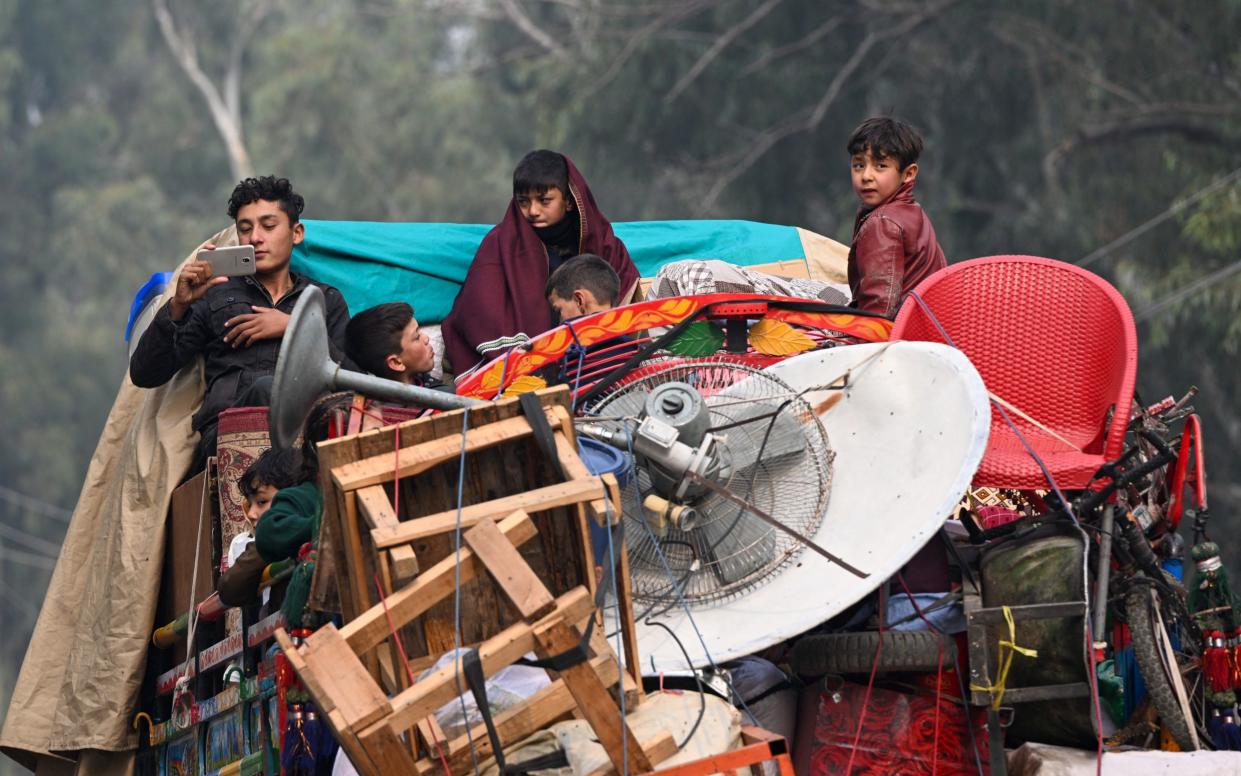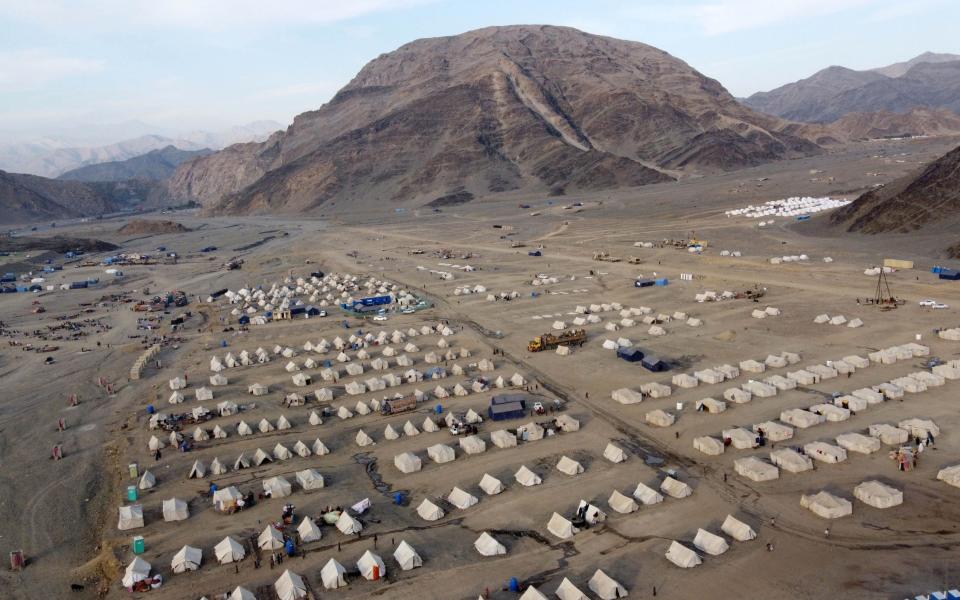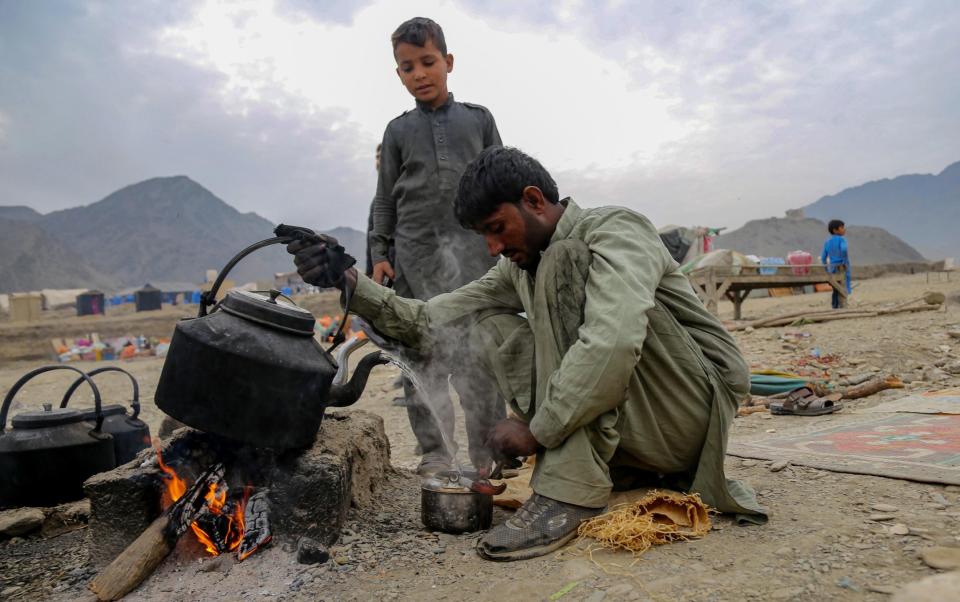UK Rwanda plan behind Pakistan’s mass deportation of Afghans

Pakistan’s prime minister has cited the UK’s Rwanda plan in a defence of his deportation of millions of Afghans from the country.
Writing in the Daily Telegraph, Anwaar ul-Huq Kakar, the interim prime minister of Pakistan, said governments all over the world are “adapting to a new era of mass migration” and that “the UK Government’s plan to deport illegal immigrants to Rwanda is a sign of that pressure”.
In October, Islamabad ordered all foreign nationals residing in the country illegally to leave by November – a decree which particularly affects Afghans.
The South Asian country hosts an estimated three million Afghan refugees and migrants – including at least 600,000 who fled persecution on the Taliban’s return to power in August 2021.

More than 450,000 Afghans have now left Pakistan, and authorities have begun arresting and deporting others who have not. Thousands more have gone underground, fearing for their lives if they return to their homeland.
The UK’s Rwanda asylum plan – which has been ruled unlawful over fears of harm to refugees – would see asylum seekers sent to Rwanda for processing, in a bid to deter people arriving in the UK.
Mr Kakar said “France is struggling while Italy has expressed fears it may become ‘Europe’s refugee camp’” and “Germany is also feeling the strain, prompting the announcement of tough new deportation measures”. He added that the situation in the US is “no easier”.
Pakistan’s problem is of a “different magnitude altogether”, he said. “Over the last three to four decades, between four and five million migrants (roughly the population of Ireland) have arrived. Many have no right to remain.”
The country’s caretaker government cited the involvement of Afghans in suicide bombings as part of the reason for its move, and said that those working on the black market “depress wages for legitimate workers”.
Mr Kakar also said the West needed to take greater responsibility for Afghan refugees from the Taliban. More than 40,000 in Pakistan are awaiting evacuation to the West, he said.
About 200 members of the Afghan special forces, trained and funded by the UK, face deportation from Pakistan back into the hands of the Taliban.
Gen Sir Richard Barrons, who served the British Army in Afghanistan for over 12 years, told the BBC the failure to relocate the troops was “a disgrace, because it reflects that either we’re duplicitous as a nation or incompetent”.
Islamabad’s decision has been met with condemnation from international bodies and refugee agencies fearing for the safety of those returning to the Taliban-run country.
The Taliban called the policy “cruel and barbaric”.

Shahid, a 35-year-old former Afghan government official, told the Telegraph last month that while he has a visa to stay in Pakistan, his wife and children do not and are now facing the threat of deportation.
Mr Shahid remains trapped – unable to return to his homeland for fear of persecution and now also unable to leave his house in Pakistan. “They [the Taliban] have threatened to kill me; they’ve already killed my friend. They call me a slave of the foreigners,” Shahid said. “We don’t leave the house at all, and have locked ourselves indoors.”
Lawyers and activists have said the scale of the crackdown is unprecedented. The interior ministry established a hotline encouraging Pakistanis to report any “illegal foreigners” living in their neighbourhoods, while the police has been searching door-to-door in refugee settlements. Large numbers of undocumented Afghans have been transported directly to the border.
In his comment piece, Mr Kakar called international criticism of the policy “predictable”, saying “in any such programme, there will always be a small number of particularly difficult cases”.
He said that Pakistan has set up 79 transit centres and given free meals and shelter to those crossing back into Afghanistan.
Speaking about Afghans fearing persecution of the Taliban, he added: “We are reassured by the strong tribal and regional links between those who are being repatriated and the authorities in Kabul and Kandahar.”
He also insisted that Pakistan will “continue to fulfil our legal, moral and humanitarian obligations”.
Pakistan will hold elections on Feb 8. Imran Khan, the former prime minister, has been jailed after declaring the military was behind his ousting from power.
Pakistan’s powerful armed forces have long objected to the presence of millions of Afghans living inside the country, viewing them as a security threat.
In his first year in power, 2018, Mr Khan offered all Afghans living in Pakistan a path to full citizenship, before u-turning reportedly under pressure from the military.
At the crossroads of history
All over the world, governments are adapting to a new era of mass migration linked to conflict, climate change, and economic opportunism. The West is no stranger to painful judgments that must be made in managing undocumented foreigners. The UK Government’s plan to deport illegal immigrants to Rwanda is a sign of that pressure. The heated debate surrounding the proposal and the many efforts to derail the scheme illustrate the huge challenges for policy makers as they seek to balance human rights with hard realities, writes Anwaar ul-Haq Kakar, the Interim prime minister of Pakistan.
France is also struggling, while Italy has expressed fears that it may become “Europe’s refugee camp”. After opening its arms to several million refugees in recent years, Germany is also feeling the strain, prompting the announcement of tough new deportation measures. The situation in the US is no easier.
Pakistan’s problem is of a different magnitude altogether. Over the last three to four decades, between four and five million migrants (roughly the population of Ireland) have arrived. Many have no right to remain. Despite being a non-signatory to 1951 Convention on Refugees (and its 1967 Protocol), we have generously accommodated the single largest case load of refugees.
Hospitality is in Pakistan’s DNA which is why we have, and will continue to fulfil our legal, moral and humanitarian obligations.
We have worked very hard, over a very long period of time, to accommodate as many as we can while giving those with no right to remain ample opportunity to leave voluntarily.
Unfortunately, despite frequent opportunities to repatriate voluntarily, and multiple government attempts to register those who remain undocumented, a significant number has persistently refused to formalise their status, choosing instead to stay in the shadows.
While Pakistan has benefited from many hardworking and law-abiding migrants, the overall socio-economic and security cost of this huge influx has been staggering. Many work on the black market, paying no tax, depressing wages for legitimate workers. They are also susceptible to exploitation by the criminal underworld, with all its disturbing links to terrorist organisations operating in the region.
‘Treat deportees with respect and care’
Since Aug 2021, at least 16 Afghan nationals have carried out suicide attacks inside Pakistan, while 65 terrorists killed in encounters with security forces, mainly in the bordering region, were identified as Afghans. No responsible government can ignore such concerns. Whenever we raised this with the interim Afghan government, they advised us to “look inwards”. We have finally decided to heed to their advice to put our house in order.
Our painstaking repatriation programme has attracted predictable criticism from those who do not understand the complex history of the problem – or the extraordinary efforts that have been made to avoid forcible deportations.
Misinformation and unfounded allegations abound, especially on social media. In any such programme, there will always be a small number of particularly difficult cases. We felt – and continue to feel – a deep responsibility for the welfare of all of those being repatriated, which is why all officials involved in the program are under strict orders to treat deportees with due respect and care.
Furthermore, our emphasis is on voluntary, safe and dignified repatriation of individuals (along with their legally acquired assets), and not on deportation. Some 93 per cent of those who have returned to Afghanistan have done so voluntarily. Importantly, none of the 1.46 million Afghans who applied for proof of registration cards have been returned; nor have 800,000 or so individuals who hold Afghan citizen cards.
We have set up some 79 transit centres, providing free meals, shelter and medical facilities while additional crossing points have been opened on the Pakistan Afghan Border to facilitate the processes. Security personnel are escorting the immigrants to border crossings, taking particular care of women and children. Emergency helplines are available to report any abuses.
Much has been made of the risk of persecution of those who return. We take this very seriously, and are reassured by the strong tribal and regional links between those who are being repatriated and the authorities in Kabul and Kandahar. The interim Afghan government has also shown visible concern for the welfare of those who return.
The abrupt withdrawal of western allies from Afghanistan in Aug 20201 prompted a whole new influx of refugees to Pakistan. Hundreds of thousands of Afghan nationals crossed the border, claiming their lives were in danger. Again, we take their welfare very seriously, recognising that some do require special protection.
We will not deport at-risk groups, such as musicians, journalists, and human rights activists. We do however need help from other countries.
Unfortunately, only 59,033 of the new arrivals have been resettled outside Pakistan, while 42,068 await evacuation to the west. The rest have failed to put forward a convincing case to anyone for asylum, and continue to stay in Pakistan illegally.
Pakistan, today, stands at the crossroads of history. We can no longer continue to compromise our national security by accommodating such huge numbers of undocumented individuals. Our ultimate aim is to build a safer, more peaceful and prosperous Pakistan – with associated benefits for our own people, for the region, and the wider world.
Anwaar ul-Haq Kakar, the Interim prime minister of Pakistan

